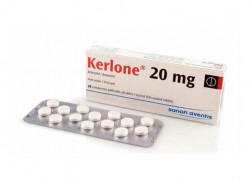Kerlone (betaxolol) Coupons, Discounts & Cost
Kerlone (betaxolol) is a selective beta-blocker. One way to save money on the Kerlone (betaxolol) retail cost regardless of income and insurance status is to use Kerlone coupons or discount cards from RXCoupons. Use our Betaxolol coupons at your online pharmacy and receive up to 75% off the sale price each time you refill your prescription.
What is Kerlone (betaxolol)?
Kerlone (betaxolol) is a selective beta-blocker that has hypotensive effect (lowers blood pressure) and prevents high blood pressure associated with physical stress, emotional stress, and other factors. This drug helps control blood pressure, which affects the quality of life of many patients. There may be allergic responses in predisposed patients in the first days of therapy. When used in therapeutic doses, the drug has no cardiodepressive action. It has no effect on glucose metabolism and does not reduce the bronchodilator effect of beta-agonists.
Kerlone is used for the treatment of hypertension (increase in your blood pressure).
Kerlone (betaxolol) dosage information
Adults usually take 0.02 g once daily. It is not necessary to correct the dosage regimen in patients with renal insufficiency. The initial dose for patients on hemodialysis is 0.01 g per day. It is not necessary to correct the dosage regimen in patients with liver failure.
What are the possible side effects of Kerlone (betaxolol)?
At the beginning of the treatment, there may be asthenia (weakness), paresthesia, atrioventricular block, sinus bradycardia (slow heart rate), hypertension (low blood pressure), heart failure, Raynaud's syndrome.
Other side effects: bronchospasm (bronchial narrowing), symptoms of psoriasis.
Nervous system: insomnia, asthenia, emotional lability, depressed mood, headache, vestibular disorder, neuralgia, hallucinations, nightmares, impaired concentration, drowsiness, dizziness, syncope, amnesia, neuropathy, paresthesia, partial loss of hearing, ear pain, tremor.
Urinary tract: renal colic, oliguria, impotence, cystitis, proteinuria, dysuria, Peyronie's disease, prostatitis, decreased libido, menstrual irregularities, swelling.
Cardiovascular system: bradycardia, hypotension, atrioventricular block, palpitations, heart failure, thrombosis, leukocytosis, anemia, hypertension, thrombocytopenia, myocardial infarction.
Digestive tract: constipation, dysphagia, nausea, dyspepsia, epigastric pain, irritable bowel syndrome, dryness of the mouth, vomiting, anorexia.
Respiratory system: chest pain, infections of the upper respiratory tract, rhinitis, bronchospasm, cough, sinusitis, pharyngitis, dyspnea, respiratory failure, dyspnea.
Other adverse reactions: alopecia, skin rash, myalgia, tendonitis, arthralgia, exacerbation of psoriasis, eczema, hypertrichosis, erythema, hypokalemia, hyperuricemia, acidosis, hyperlipidemia, change in body weight, hypothermia, high cholesterol levels.
What happens if I overdose?
High doses can cause arrhythmia, congestive heart failure, bradycardia, dizziness, hypoglycemia, convulsions, collapse, hypotension. You need to seek immediate medical attention if Kerlone overdose is suspected.
When you should NOT take Kerlone (betaxolol)?
Absolute contraindications: hypersensitivity to betaxolol, chronic heart failure, atrioventricular block (II-III degree), sinus bradycardia (slow heart rate), Prinzmetal angina, cardiogenic shock, lactase deficiency, congenital galactosemia.
Relative contraindications: bronchial asthma, chronic obstructive bronchitis (inflammation of the bronchi), metabolic acidosis, psoriasis, circulatory failure, hemodialysis, diabetes mellitus, depression, thyrotoxicosis, vascular disease, during breastfeeding.
What are Kerlone (betaxolol) interactions with other drugs?
Betaxolol should not be used together with xanthine derivatives and halogenated anesthetic agents. The absorption of the active substance is markedly reduced when taking antidiarrheal medicines and antacids. Other antihypertensive drugs increase the hypotensive effects of Kerlone.
Betaxolol is able to prolong the effect of non-depolarizing muscle relaxants. Corticosteroids and NSAIDs reduce the hypotensive effect of Betaxolol. Cardiac glycosides may increase bradycardia. The risk of orthostatic hypotension is higher with tricyclic antidepressants (imipramine).
Betaxolol may increase the concentration of lidocaine in the blood.
Kerlone (betaxolol) special instructions
Patients with COPD and bronchial asthma should start betaxolol therapy with small doses. The therapy should be stopped if you have surgery planned.
Patients suffering from angina pectoris should not abruptly stop taking the drug. Sudden cancellation of therapy can cause myocardial infarction and sudden death (in more severe cases).

